|
Inside
Issue N°8 - May 2002
Important
peace moves in Eritrea and Ethiopia
Women in conflict zones want peace and justice
Lausanne: 75th anniversary of Faith and Order
People
Criteria for participating in international inter-religious
initiatives
Focus on Indigenous people
Sexual violence in West Africa
Mission and Evangelism
Middle East conflict
WCC financial situation
Online Giving
This issue's Guest Editor
Recent publications
General information on the WCC News
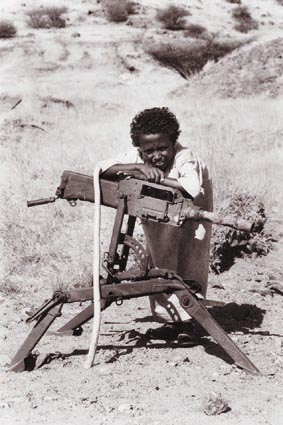 |
Important
peace moves in Eritrea and Ethiopia |
|
|
|
|
In mid-February,
inter-religious peace committees in Ethiopia and Eritrea paid
joint visits to leaders of their respective countries to seek
reconciliation after four years of devastating war. Soon after
all-out war broke out in 1998 over a disputed border territory,
leaders of the Orthodox, Lutheran and Roman Catholic churches
and of the Muslim communities on both sides formed emergency committees
in the hope of building a bridge for peace between the two peoples.
Norwegian Church Aid (NCA) accompanied these committees from the
beginning, and a World Council of Churches (WCC) and All Africa
Conference of Churches (AACC) joint delegation visited Asmara
and Addis Ababa early on to offer international support. NCA continued
these contacts on behalf of the wider ecumenical fellowship, and
brought the religious leaders together several times. At one such
meeting, in Oslo in 1999, they signalled their intention to visit
their two national leaders as soon as possible to urge an end
to the war. But it was not until after
|
|
|
A young
herdsman near Agordat, about 130 km west of Asmara |
|
|
United
Nations and Organization for African Unity mediators managed to
negotiate an end to the fighting that official agreements were
finally obtained to receive the religious committees. On February
13, religious leaders from Ethiopia travelled to Asmara, where
they were received warmly at a series of public meetings, and
met the Eritrean minister of foreign affairs. In Addis Ababa,
they were again received by welcoming throngs at public meetings,
and met with the president of Ethiopia. Was this too little and
too late? "All those involved would have liked to have seen these
symbolic acts of religious leadership for peace come months or
even years sooner," says Dwain Epps, WCC International Affairs
coordinator. "Yet the joint commitment of religious leaders to
remain in dialogue throughout the conflict undoubtedly helped
to create a propitious climate for peace. The open fighting has
now ended, but the divisions are still deep and durable peace
is far from assured." "It is never too late to build the basis
for a lasting peace," Epps says. "The task of post-conflict reconstruction
and reconciliation remains an urgent and arduous one. People look
to the religious leaders to take a lead. We sincerely hope that
they will continue together to help heal the wounds of war, and
restore broken relationships and mutual confidence between the
two nations and their leaders." |
|
|
|
|
Women
in conflict zones want peace and
justice |
|
Forty-five
women from various conflict zones around the world met at the
Ecumenical Centre in Geneva between 17 and 20 March 2002 to share
their experiences. The women described how they and their children
suffer as the main victims of war and conflict. Living in fear
and anxiety, many suffer violence and abuse at the hands of soldiers
or men belonging to other ethnic groups. Some suffer violence
not only as a result of war; they are also victims of racial violence.
Others face permanent economic violence; for them the task of
feeding their families is a daily battle. Ensuring that their
families survive, and helping them rebuild their shattered lives
are heavy burdens to bear. |
The conference
was jointly sponsored by the World Council of Churches (WCC) women's
programme, headed by Aruna Gnanadason, and those of the Lutheran
World Federation (LWF), the World Alliance of Reformed Churches
(WARC) and the Conference of European Churches (CEC). "Making
women's voices heard… this is the challenge in a fast-changing
world! Women are at the centre of survival initiatives and of
local efforts at bringing reconciliation. The question the women
asked is why they are not at negotiating tables to deal with conflict,"
said Gnanadason. |
| |
|
| Lausanne:
75th anniversary of Faith and Order |
On
25 August 2002, Faith and Order will celebrate 75 years of work
since the first world conference on Faith and Order in Lausanne
(1927). The celebration will be held in the Lausanne (Switzerland)
cathedral with local churches, who recently formed their own ecumenical
covenant. The celebration will invite participants to remember
and reappropriate the insights of the 1927 founding assembly,
acknowledging that the identity of the contemporary ecumenical
movement was deeply influenced by that assembly. According to
Alan Falconer, Faith and Order director and team coordinator:
"At the Lausanne conference, the representatives of the churches
became aware of central aspects of Christian faith that they could
affirm together. They also identified questions which divide the
churches and on which they needed to reach agreement if the churches
were to be one as Jesus Christ willed (John 17). For example,
agreement was needed on baptism, eucharist, ministry, and understanding
the nature of the churches. These items formed the agenda for
Faith and Order's work throughout the 20th century." Over the
years, a number of different methods for reaching consensus have
emerged. Many agreements have been reached, perhaps the best of
which is that on baptism, eucharist and ministry. This has transformed
the relationship between churches and demonstrated that patient
dialogue leads to change. As a continuation of this work, a new
study of the nature of the church is underway. "For 75 years,
Faith and Order has encouraged churches to move towards a unity
which is God's gift and the task of the church. We are called
to move beyond present perceptions and boundaries to make evident
our unity through baptism in Jesus Christ," Falconer concludes.
|
|
|
| People |
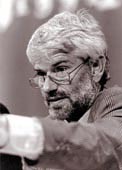 |
In Memoriam
Jan H. Kok (1942-2002)
After a long and courageous battle against cancer, Jan H. Kok
died on 7 February 2002 at the age of 59. The son of a family
of Dutch publishers. Jan Kok joined the WCC in 1973 as director
of Publications. While director of Communications between 1987
and 1999, he launched the "Risk Books" series popularizing
major ecumenical issues. Having introduced the idea of a "Dictionary
of the Ecumenical Movement", he was also one of the founders
of the ecumenical press service, ENI. Jan Kok leaves a wife, Birgitta,
two children, Jakob and Frederik, in Geneva and his mother and
sister in the Netherlands. |
Marga Bührig
(1915-2002)
A doctor in philosophy, Marga Bührig died on 12 February
2002 at the age of 86 in Binningen, Switzerland. Between 1983
and 1991, Bührig was one of three women elected to the eight-member
presidium of the WCC. She was closely involved in the planning
and preparation of the world convocation for "Justice, Peace
and the Integrity of Creation", held in Seoul, Korea, in
1990. Throughout her life, Bührig worked to advance equal
opportunities, and especially to increase the participation of
marginalized people.
|
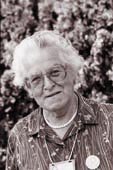 |
Metropolitan Bishop Timothée
of Corfu (1939-2002)
A few days before his death on 15 March 2002
at the age of 63, Timothée of Corfu led the first official
delegation from his church to the Vatican. Born in Corfu, Metropolitan
Bishop Timothée studied theology, sociology and the pastoral
care of seafarers and tourists. His studies took him from Athens
to England, the United States and Italy. He was elected bishop
in 1984, and nominated as coordinator of relations between the
Greek Orthodox Church and the European Community. He led his church's
delegation at the WCC assembly in Harare, where he was elected
to the WCC central committee. |
|
Susanta Adhikari
The people and Christian community in Bangladesh
have lost a prominent ecumenical leader in the person of Mr Susanta
Adhikari, who died on 22 February 2002 in Dhaka, Bangladesh. Adhikari
was president of both the National Council of Churches and of
the Bangladesh Baptist Churches Sangha. He was also a delegate
to the WCC assembly in Harare. Adhikari spent his life working
for poor and marginalized people, and demonstrated unfailing commitment
and openness to work for the unity of the churches and the ecumenical
movement in Bangladesh. |
|
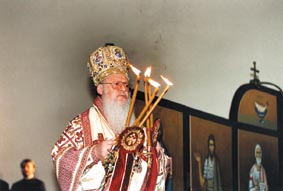
His All Holiness Ecumenical Patriarch Bartholomew
|
His All Holiness
Ecumenical Patriarch Bartholomew has been awarded the Norwegian
Sophie Prize 2002 for spiritual and practical ecumenical leadership
in protecting and healing the earth. Known as the "Green
Patriarch", Patriarch Bartholomew links faith to the environment,
reminding all people of faith of their direct responsibility to
protect the earth. In raising the environmental awareness of Orthodox
faithful worldwide, he challenges leaders of all faiths to do
the same.
Patriarch Bartholomew draws attention to both rights and obligations,
criticizing over-consumption in the first world, and the lack
of justice that causes inequity in developing nations. A committed
ecumenical leader, he served on the central and executive committees
of the World Council of Churches and the Faith and Order commission
as its vice-moderator.
The Sophie Prize was established in 1997 as an annual international
recognition of people working towards a sustainable future. |
General
Secretariat
Sabine Udodesku
from Bochum, Germany,
executive secretary in the General
Secretariat, ordained minister in the
Evangelical Church of Westphalia in
Germany.
|
|
Bossey
Ecumenical Institute
Elizabeth S. Tapia from Bulacan, Philippines,
lecturer on mission for Bossey, an ordained elder in the United
Methodist Church.
|
| |
|
|
Cluster on Communication
o Olivier Schopfer,
from Switzerland,
executive web editor in the Public
Information team, member of the
Protestant Church of Geneva. o
Yannick Provost, from France,
publisher,in the Publications and
Information team, member of the
Orthodox Archidiocese of
France, under the jurisdiction of
the Ecumenical Patriarchate of
Constantinople.
o Theodore
Alexander Gill, from
New York, senior editor, Publications
and Documentation team, member
of the Presbyterian Church (USA). |
|
Cluster on Issues
and Themes
- Justice, Peace and Creation team
o André Karamaga,
from Kigali, Rwanda,
consultant for Focus on Africa, member
of the Presbyterian church.
o Athena Peralt, from
Manila, Philippines,
consultant for Women, Economy and
Rural Development, member of the
United Church of Christ.
- Mission and Evangelism team
o
Christoph Mann, from Germany, project
manager (consultant) for the Ecumenical
HIV/AIDS Initiative in Africa, member of
the Evangelical Lutheran Church in
Württemberg, Germany.
|
|
|
| Criteria for
Participating in International Inter-religious Initiatives |
For some time now, the World
Council of Churches (WCC) and other religious organizations have
been receiving a growing number of requests to join national and
international inter-religious initiatives. The need for guidelines
for participation in such initiatives spurred the holding of a
multifaith meeting in Hong Kong, 8-12 April.
At the meeting, about 25 participants from of Buddhist, Christian,
Hindu, Jewish, Muslim, and Sikh religions looked at some of the
current examples of global inter-religious organizations such
as the International Association for Religious Freedom, the World
Conference on Religion and Peace, and the Global Ethics Foundation,
and recent interfaith initiatives such as the Millennium World
Peace Summit of Religious and Spiritual Leaders and World Faiths
Development Dialogue.
Participants considered all the initiatives as positive signs
of the growing awareness of the need for interfaith cooperation
and dialogue, but cautioned that religious leaders need to closely
examine the context, purposes and framework for participation
before joining specific initiatives. The idea that, because churches
increasingly face religious plurality in their society, the WCC
may need to consider a "wider ecumenism" as encompassing
relations with other faith communities was advanced as one challenge.
Perhaps, as one participant put it, we are at a place where the
Lund principle of ecumenism - "that which we can do together,
we should not do separately" - should apply to interfaith
relations as well.
Hans Ucko, WCC staff for Inter-religious Relations and Dialogue,
said he was impressed that so many representatives from other
faith traditions "took their time to give advice to the WCC".
This, he noted, reflects not only a growing need to assess possibilities
for a common religious agenda, but also the importance of the
WCC as a partner at the international level. |
|
|
| Focus on Indigenous People |
|
What
is the reason for the WCC's focus on Indigenous Peoples? Eugenio
Poma Añaguaya, who coordinates the Council's Indigenous
Peoples' work, explains:
"A small percentage of the world's population lives a religion
of greed and exploitation. By their actions, the whole creation
has been thrown into imbalance. Economies, cultures, religions
and political systems have been corrupted, driving peoples away
from their lands, polluting and disrupting the environment upon
which all life depends. It is important to recognize the contributions
of all Indigenous Peoples through their history, culture, and
spirituality to preserve the creation for future generations."
The work has two main facets. The first is encouraging Indigenous
Peoples' consciousness of their relationship with the land and
|
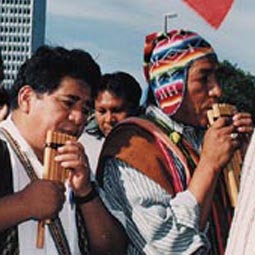 An Indigenous Peoples' celebration at the
UN in Geneva (left: Eugenio Poma of the WCC Indigenous programme)
An Indigenous Peoples' celebration at the
UN in Geneva (left: Eugenio Poma of the WCC Indigenous programme)
|
| affirming their identity,
culture, cosmovision and philosophies of life, and also promoting
dialogue between Indigenous spiritual leaders and Christian church
leaders. The second is advocacy: it involves promoting, accompanying,
developing and protecting the rights of Indigenous communities
at local, regional and global levels. In Central and South America,
the emphasis is on land and self-determination; in Africa, it
is on spirituality in the face of environmental racism.
"All churches are faced with the challenge of standing with
Indigenous communities when they are dispossessed of their lands
and are denied justice," says Poma. |
|
|
| Sexual Violence in West
Africa |
The churches have reacted swiftly
to allegations of sexual abuse and exploitation of refugee children
in camps in Sierra Leone, Liberia and Guinea. The World Council
of Churches (WCC), Action by Churches Together (ACT) and the Lutheran
World Federation (LWF) immediately sent an ecumenical team to
follow up on the accusations made in a confidential report published
by the United Nations High Commissioner for Refugees (UNHCR).
Some ACT members (in Sierra Leone and Liberia) were implicated
in the report, which made specific accusations of bad conduct.
ACT International, supported by the LWF and the WCC, on 1 March
published a statement condemning all forms of sexual abuse and
emphasizing "its profound disquiet about apparently serious
acts of sexual violence and exploitation perpetrated against children
by humanitarian aid workers".
According to Melaku Kifle of the WCC International Relations team,
"We need to discuss how the churches, at local, national
and international levels can raise awareness about this sexual
violence and harassment and take measures to put a stop to it.
Such violence is not tolerable under any circumstances."
Most of the people met by the team agreed that sexual violence
and exploitation is an issue, especially in the context of the
wars taking place in these three countries. There was a consensus
that the UNHCR/Save the Children Fund (UK) report was a "wake-up
call" to humanitarian organizations.
Unfortunately, according to the ecumenical delegation, the implementation
of practical recommendations aimed at ensuring a local, regional
and international responses can be compromised by the lack of
adequate resources, such as funding. They recommended that ACT
members and partner agencies try to redress the situation by asking
their governments to increase financial support to UNHCR and other
humanitarian aid organizations working with refugees. |
|
|
| Mission and Evangelism |
The WCC's Mission and Evangelism team is preparing
two major conferences: a June 26-2 July 2002 international consultation
in Breklum, Germany, and its world mission and evangelism conference
in 2005.
World mission conferences are held every 7-8 years; the last such
conference was held in Salvador de Bahia, Brazil, in 1996. The 2005
conference will focus on churches as reconciling and healing communities
amidst multifaceted and changing contexts in a violent and globalized
world.
The conference is expected to move away from producing long reports,
and rather draw on experiences from local churches and mission groups
worldwide. With a proposed ceiling of 500 participants, those unable
to attend will be offered the possibility of interactive sessions
on the web.
The theme of the Breklum consultation is "Believing without
belonging? In search of new paradigms of church and mission in secularized
and post-modern contexts". Missiologists from all regions of
the world will look at new situations and challenges to church and
mission, and their deliberations help prepare for the 2005 conference. |
|
|
| Middle East Conflict |
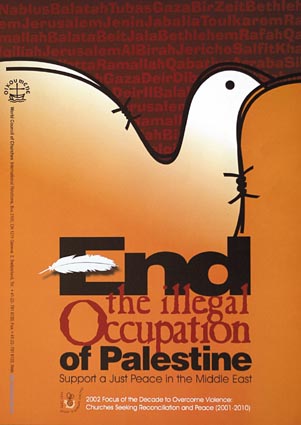 |
Solidarity through
active presence, advocacy to bring about public policy change,
witnessing non-violent resistance to the occupation of Palestine,
protection and deterrence of violence: these are the four priorities
of an Ecumenical Accompaniment Programme in Palestine and Israel
(EAPPI) which will be operational as of August.
The programme is based on a framework developed last February
by a working group of 41 participants from World Council of Churches
(WCC) member churches and ecumenical partners in Jerusalem, Europe,
North America and South Africa. As preparations continue on the
recruitment and training procedures for participants, an EAPPI
pilot project,the Christian Accompaniment Programme, has been
underway on the ground since March. Eight participants, seconded
by Danchurchaid and Icelandic Church Aid, have been regularly
reporting on human-rights violations, facilitating |
access for health teams crossing
military checkpoints, and escorting humanitarian convoys to the
Occupied Palestinian Territories.
Participation in the EAPPI is proof that the church responses
to the conflict have moved up one level says Salpy Eskidjian of
the WCC International Relations team. "The programme signals
a shift from strong statements of principle to tangible solidarity
on the ground: physically helping and giving hope to local Christian
and Muslim Palestinian and Israeli peace activists in their non-violent
struggle to resist the military occupation."
The EAPPI is a central element of the Ecumenical Campaign to End
the Illegal Occupation of Palestine: Support a Just Peace in the
Middle East, through which the WCC has invited member churches
and partners to join in advocating an end to the occupation as
a means of addressing the root causes of the conflict, helping
create a viable Palestinian state, and working for a negotiated,
secure and just peace in the Holy Land. |
|
|
| WCC Financial
Situation |
| Discussions currently underway among representatives
of the programme committee of the WCC central committee, the officers
of the finance committee and members of the staff leadership group
are aimed at increasing contributions from WCC member churches,
confirming anticipated contributions from traditional donors, and
identifying potential new sources of revenue. These efforts are
accompanied by measures to reduce the operational budget for 2002
by 10%, and the staff budget line for 2003 by 7-10%. Plans are to
be presented in final draft form to the officers at their meeting
in Geneva in June. |
|
|
| Online Giving |
To give online or offline
to WCC work on Africa, Israel/Palestine, overcoming violence, globalization,
and talking with other faiths, visit our website:
http://www.wcc-coe.org/wcc/donations/index-e.html
Please give now! |
|
|
The guest editor for this
issue of WCC News is Ben Pohue. Assisted
by many able contributors, Pohue edits the bilingual Protestant
monthly magazine known as "Veà porotetani", published
by the Evangelical Church in French Polynesia (EEPF). |
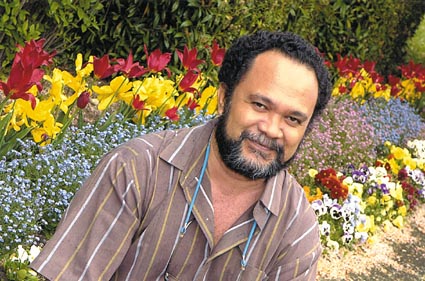 |
|
|
| |
Elisabeth Raiser and Barbara
Robra eds
WITH LOVE AND WITH PASSION
Women's Life and Work in the Worldwide
Church
Based on a photo exhibit marking the end of the Ecumenical Decade
of the Churches in Solidarity with Women, a tribute to the contribution
of women to the ecumenical movement.
196pp., Sfr.36.00, US$21.50, £14.95, Euros 24.00
CRISIS IN CHECHNYA
Background information
128pp., available free of charge
Hans-Ruedi Weber
WALKING ON THE WAY
Biblical Signposts
In discussing the great festivals of the ecclesiastical year
and the important periods in between, the author draws on the
work of artists, especially painters and weavers, interpreting
the images and symbols they use.
110pp., illustrated, Sfr.17.00, US$9.95, £6.95, Euros
11.00
Janice and Philip Wickeri eds
A CHINESE CONTRIBUTION TO ECUMENICAL THEOLOGY
Selected Writings of Bishop K.H. Ting
Essays and sermons spanning the 60-year career of the author
as a leader of the Chinese church and an ecumenical theologian.
approx. 128pp., Sfr.17.00, US$12.95, £8.95, Euros 15.00
YEARBOOK
2002
A review of the main events bearing on the life and work of
the WCC in 2001, and lists of the member churches, national
and regional ecumenical bodies, specialized ecumenical organizations
(with addresses, telephone and fax numbers, and e-mails), and
members of central committee and staff. Also included are the
WCC's constitution and rules.
approx. 116pp., approx. Sfr.19.00, US$11.50, £7.95, Euros
13.00
Video
LEARNING FOR IDENTITY
This video gives people from different contexts and cultural
backgrounds an opportunity to share with the viewer their thoughts
and reflections on "learning for identity". It should
be shown section by section: there are 14 sections, each about
7 minutes long. Total playing time: 104min. Available in English/PAL
+ English/NTSC.
Sfr.29.50 (+ postage Sfr.6.00), US$19.50 (+ $13.00), Euros 20.50
(+ Euros10.00)

|
|
WCCNews
is published four times a year and distributed free of charge.
However, if you wish to make a contribution (the equivalent of
US$20 minimum),
payable by cheque made out to "WCC" or Visa or Mastercard,
this would be welcome.
Please indicate "For WCCNews" |
Produced by:
WCC Public Information Team
Guest editor for this issue:
Ben Pohue
Managing editor:
Kristine Greenaway
For further information write
to:
WCC NEWS
WCC Communication
P. O. Box 2100
1211 Geneva 2
Switzerland
Telephone: (41-22) 791 6111
General Fax: (41-22) 791 0361
E-mail for enquiries: bob@wcc-coe.org
WCC Communication fax: (41
22) 798 1346
World Wide Web:
http://www.wcc-coe.org
Please feel free to reproduce this material and pass it
on, acknowledging the source
Design: Marie Arnaud Snakkers
Internet Design: Cécile
Requedaz, WCC
Printed in Switzerland
©WCC
Original: English and French
|
©
2002 world council of churches | remarks to
webeditor@mail.wcc-coe.org
|
